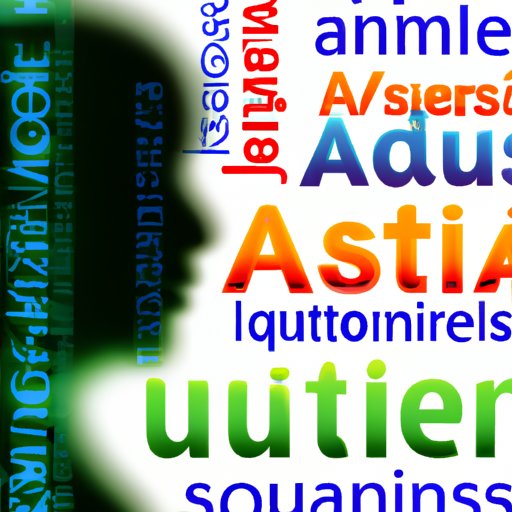
I. Introduction
Autism is a complex developmental condition that affects individuals differently. It is a condition that has been heavily researched over the years, sparking debates and discussions. One of the most significant debates surrounding autism is whether it is a mental illness or not. In this article, we will explore this topic in depth, debunking the misconceptions, and providing vital information about autism and its correlation with mental health.
II. Understanding Autism as a Developmental Condition
Autism, also known as Autism Spectrum Disorder (ASD), is a developmental disorder that impacts communication, social interaction, and behavior. It is a neurodevelopmental disorder, which means it is a condition that affects the brain’s development and functioning. Autism is considered a spectrum disorder since its symptoms and severity can differ greatly from one individual to another.
The Diagnostic and Statistical Manual of Mental Disorders (DSM-5) provides a set of diagnostic criteria for autism. To be diagnosed with autism, an individual must display persistent deficits in social communication and social interaction across multiple contexts. Individuals with autism may also display restricted, repetitive patterns of behavior, interests, and activities.
Common signs and symptoms of autism include:
- Delayed language development or complete lack of speech
- Echolalia (repeating what others say)
- Trouble with social cues and nonverbal communication
- Difficulty taking turns during social interactions
- Fixation on certain subjects, objects, or patterns
It is essential to note that autism is not a mental illness or a psychiatric disorder. While autism can impact mental health, it is not the same as mental illness or psychiatric disorders.
III. Debunking the Misconception of Autism as a Mental Illness
There is a common misconception that autism is a mental illness. Mental illness refers to a wide range of mental health conditions that affect mood, thinking, and behavior. Autism, on the other hand, is a developmental condition and not a mental illness.
It is easy to see why people may confuse the two conditions. The symptoms of autism can often lead to mental health concerns, such as anxiety and depression. However, it is essential to recognize that autism is not a mental illness.
There are also differences between autism and mental illness. Individuals with mental illness may experience a wide range of symptoms, including hallucinations, delusions, and disordered thinking. These symptoms are not present in individuals with autism.
IV. Autism and Mental Health: Exploring the Correlation and Management Strategies
While autism is not a mental illness, it is strongly correlated with mental health conditions. Research has shown that individuals with autism are at a higher risk of experiencing mental health concerns than individuals without autism.
Some of the most common mental health conditions associated with autism include:
- Anxiety disorders
- Depression
- Obsessive-compulsive disorder (OCD)
- Attention Deficit Hyperactivity Disorder (ADHD)
Individuals with autism who have co-occurring mental health conditions may require additional support. Management strategies can include medication, therapy, and behavioral interventions. It is important to note that individuals with autism may have difficulties with traditional forms of therapy, such as talk therapy. Therefore, alternative therapies may be more effective, such as cognitive-behavioral therapy (CBT).
V. Understanding the Needs of Individuals with Autism: A Guide for Society and Policymakers
Individuals with autism have unique needs and challenges. Unfortunately, many societies and policymakers are not equipped to meet those needs, resulting in a lack of support and resources. It is essential to understand the needs of individuals with autism to better serve and support them.
Some of the challenges individuals with autism may face include:
- Sensory sensitivities
- Difficulty with social interactions
- Communication difficulties
- Limited interests
- Repetitive behaviors
Policies and practices that better support individuals with autism include:
- Accommodations in education and the workforce
- Specialized therapies, such as occupational therapy
- Community support and resources
VI. An Interview Series with Neurodivergent Individuals Discussing Their Experiences with Autism and Mental Health
In this section, we aim to provide personal insights into autism and mental health by interviewing neurodivergent individuals.
The interviews will cover topics such as:
- Their experiences with autism and mental health conditions
- The impact of co-occurring mental health conditions on their life
- Strategies for managing mental health concerns
VII. Conclusion
In conclusion, autism is not a mental illness, but it is strongly correlated with mental health conditions. It is crucial to debunk the misconceptions surrounding autism and recognize the unique needs of individuals with autism. By better supporting individuals with autism, we can help improve their quality of life and overall well-being.
It is also essential to recognize and address the mental health concerns faced by individuals with autism. Management strategies can include medication, therapy, and behavioral interventions.
Through the interview series, we hope to provide personal insights into the lives of neurodivergent individuals and bring awareness to the importance of understanding and supporting individuals with autism.





